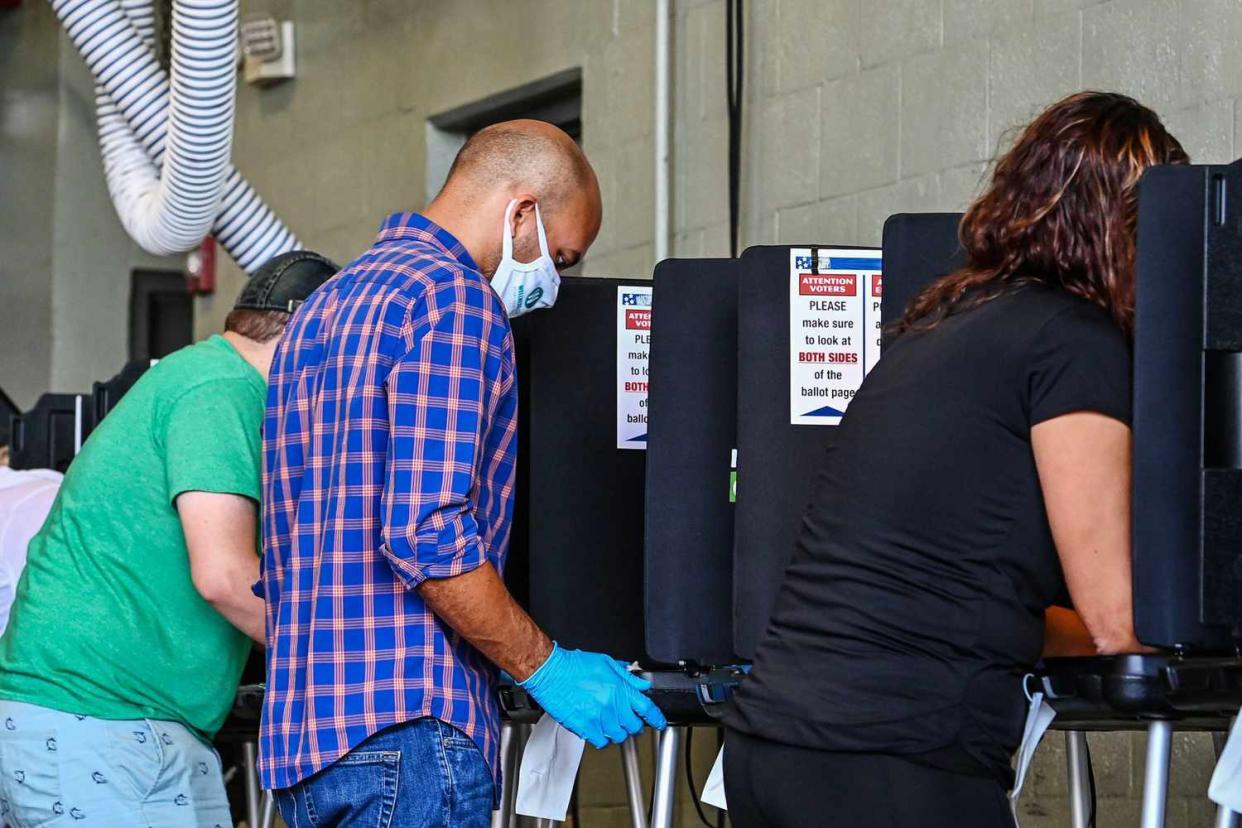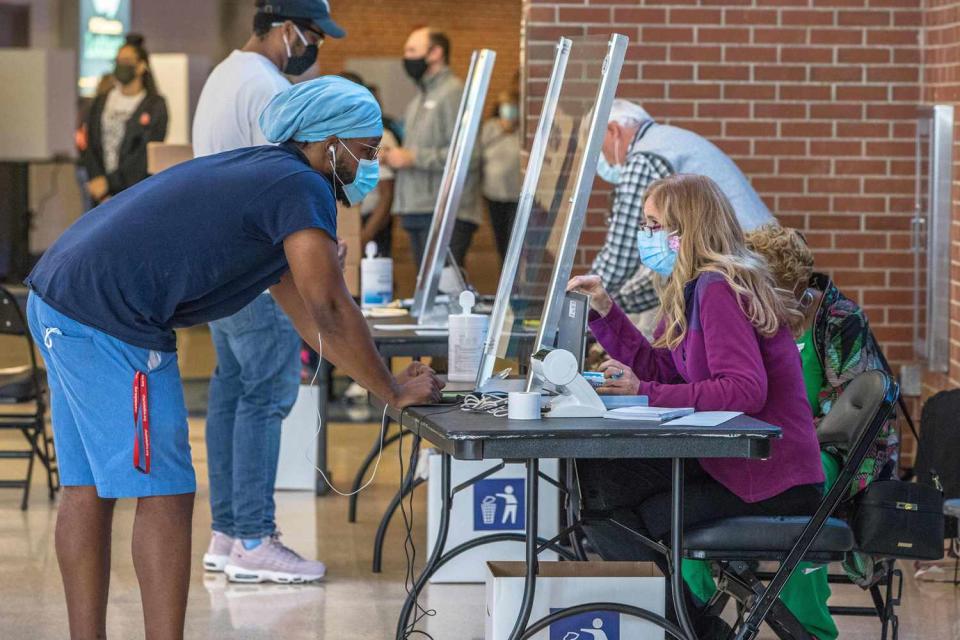Why the 2020 Election Winner May Not Be Clear on Election Night (and Why the Delay Is OK)

CHANDAN KHANNA/AFP via Getty Voters cast their ballots in Miami on Nov. 3
Not for the first time, but Americans very likely will not know the results of the 2020 presidential race by the end of election night itself.
And that's OK — despite increasingly heated and baseless claims from the president that counting lawfully received ballots after the polls is tantamount to fraud.
State election officials and voting experts have warned it will take longer than usual to count ballots for this year's general election, a byproduct of the novel coronavirus (COVID-19) pandemic and the increased interest in general leading droves of Americans to cast mail ballots.
While the circumstances surrounding this election have been nothing short of unprecedented, experts say not knowing the official results on the night polls close is a completely normal occurrence.
Indeed, while outside media organizations traditionally aim to declare winners of various races in the hours after the polls close — through a mixture of partial vote returns and data analysis — the results themselves aren't officially certified for much longer.
"We've never had official results on election night," Tammy Patrick, a senior adviser to the elections program at the bipartisan Democracy Fund Voice foundation, says.
What's more, there are notable examples in recent presidential history of some contests being too close for the candidates or media organizations to call that night. This happened in 2004, when John Kerry did not concede until the following day after more results came in from Ohio. And in the infamous example of the 2000 election, Al Gore actually retracted his concession on election night as Florida's razor-thin margin grew more obvious.
So while there are some versions of this year's election results in which either candidate clearly emerges as the front-runner — in the case of a landslide or big victory in a key state — both local officials and the outside organizations monitoring returns will be cautious about rushing to conclusions, instead urging patience to count accurately.
Election night numbers are usually estimates based on an ongoing count, which Patrick tells PEOPLE is often helped by early voting numbers and mail-in ballots cast before Election Day.
What is unusual about this year is how to handle all that mail balloting — and how quickly.

Spencer Platt/Getty Americans wait in line to vote early in New York City on Oct. 24, 2020
While the COVID-19 pandemic has forced some states to adopt mail-in voting for the very first time, it has meant different states are also still feeling out the rules — such as how late, if at all, ballots can be mailed in as long as they are postmarked by Election Day and how long election officials can count them on or even days after Nov. 3.
As is the case in the U.S., each state differs on its rules.
And those procedures have been in flux in various parts of the country throughout the year, even as recently as this week, as the election season winds down and Republicans mount legal challenges.
RELATED: Celebrities Voting For the First Time in the U.S. Election
In North Carolina, the Associated Press reported that Supreme Court justices had agreed Wednesday to allow officials to continue counting postmarked ballots until Nov. 12.
In the case of Pennsylvania, another swing state that could determine the election between Donald Trump and Democratic nominee Joe Biden, the Supreme Court ruled that postmarked ballots may be turned in until Nov. 6, but some of the justices suggested those votes arriving after Tuesday should be segregated in case they are thrown out under further review.
(Republicans in both states have pushed to limit election extensions.)
"I've been doing this now for almost 20 years and I haven't seen an election where there's been this level of change," Patrick says.

GRANT BALDWIN/AFP via Getty Americans voting early in North Carolina on Oct. 15, 2020
Only eight states expect to be able to report their results by noon on Wednesday, according to a New York Times report.
At least 22 others are allowing mail-in ballots to be counted after Election Day as long as the envelopes are postmarked by Tuesday, according to the Times. New York and Alaska have already vowed not to report their numbers on election night, while officials in swing states like Michigan and Pennsylvania have signaled they will take at least a few days to count their totals.
Trump, who has long attacked the idea of mail balloting, has meanwhile argued that post-election ballot counting should end on Nov. 3, though that raises the possibility of his own supporters' lawfully cast votes being ignored just as it would exclude Democrats.
RELATED: Early Voting Records Are Being Shattered: 'It Is Exciting!'
"We should be prepared for this to be closer to an 'election week' as opposed to an Election Day," Michigan's secretary of state, Jocelyn Benson, told NBC's Meet the Press in September. "The bottom line is we are not going to have the full results and a counting of all of our ballots on election night. We already know that. We've asked the legislature to make changes to the laws to give us more ability to be prepared and count those ballots more efficiently."
While the influx of mail-in votes this year raised concerns about the U.S. Postal Service's ability to process millions of ballots in time, "it's really more about state law and what that says about when counties can process ballots," says Amber McReynolds, the CEO of the National Vote at Home Institute.

KAMIL KRZACZYNSKI/AFP via Getty A man casts his early vote in Milwaukee, Wisconsin on Oct. 20, 2020
McReynolds tells PEOPLE some state legislatures around the country have rejected officials' requests to extend ballot counting.
In Michigan, for example, NPR reported courts ruled ballots cannot be received after 8 p.m. on Election Day despite some mail-in ballots being at risk of not arriving on time.
"I think that's problematic," says McReynolds, who is the former director of elections in Denver.
In Wisconsin, Republicans celebrated a court ruling this year to refuse extending the state's ballot deadline, the Times reported. Trump, 74, won the state in 2016 by just 23,000 votes and trails Biden, 77, this year in statewide polls.
In all, more than 230 federal lawsuits have been filed over the election, USA Today reports.

VALERIE MACON/AFP via Getty Early voting takes place in Los Angeles at Union Station on Oct. 24, 2020
The president has also sown distrust by continuously arguing that mail-in voting leads to widespread fraud.
Election experts like McReynolds and Patrick say that's rarely ever the case, though multiple voters who showed up to vote early at polling places this week have told PEOPLE they did so because they didn't trust mailing their ballots because of what's been said.
"The fact is, voter fraud — voters actually doing something wrong — is exceedingly rare," McReynolds says, pointing instead to misinformation efforts, such as Trump's. "What we see more often is bad actors trying to interfere with the process in some way."
With the election mere days away, state officials and election experts have increasingly advised voters to now turn in their ballots in person — at their correct election precinct's ballot box — to expedite the process as much as possible and ensure their vote is counted.
More than 82 million votes have already been cast via the mail or via early voting, according to the U.S. Elections Project.
Those numbers aren't just "exciting," Patrick tells PEOPLE, they're also helping the process go more smoothly.
"Voters are taking early action," Patrick says.
Have questions about how to vote ahead of the Nov. 3 election? Use vote.org to check your state-specific information about registering to vote, voting by mail, early voting, finding your polling place and more. Early and mail voting are already underway across much of the country, while many states also allow voters to register at their polling places on the same day they cast their ballots.


